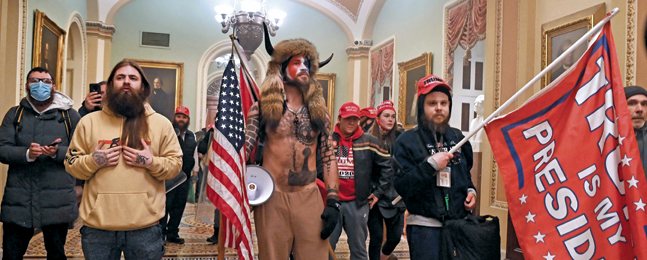Code Words and Crumbs: Deciphering QAnon Messaging
A Q&A with cultural anthropologist Janet McIntosh on Q’s communication style and its impact on the alt-right faithful.

Saul Loeb / AFP via Getty Images
SOWING CHAOS: Insurrectionists inside the U.S. Capitol on Jan. 6. 2021.
Anthropology professor Janet McIntosh is co-editor of the 2020 book “Language in the Trump Era: Scandals and Emergencies” (Cambridge University Press). In February, she published an article on the linguistic patterns found in postings by Q, the anonymous figurehead of the QAnon movement, in the journal Anthropology Today.
Here, McIntosh explains what she’s learned in her study of QAnon’s “alt-signaling,” her term for Q’s “indirect, ambiguous or cryptic semiotic forms [that] allude to sinister, illicit or conspiratorial dynamics.”
Can you give a brief overview of what QAnon is?
“QAnon” is shorthand for a far-right political phenomenon that emerged over social media. An anonymous entity known as “Q,” who posed as a high-level government insider and was probably more than one person, was followed by growing numbers of “Anons,” anonymous enthusiasts on the internet.
Between October 2017 and December 2020, Q posted approximately 5,000 messages — or “Q-drops” — on anonymous chat boards such as 4chan, 8chan and 8kun. The messages allude to a grand subterranean conflict between the political right and left. Q claimed a corrupt group of Democrats and liberals were committing nefarious deeds, such as the sex trafficking of children, while brainwashing the public. On the side of virtue sat Donald Trump, messiah-like, supported by various allies.
Q liked to whisper about an imminent upheaval, known as “the Storm,” in which a Trump-led military would rise up to seize the country’s infrastructure, arrest top Democrats and install a far-right totalitarian regime.
What do we know about Anons?
Demographically, most Anons are white, and, politically, many are white-supremacist. In mid-2018, they began to emerge from the internet to participate in Trump rallies, sporting the letter Q on badges, T-shirts and the like. Some evangelical pastors introduced their congregations to QAnon theories, and a handful of Q-supporting Republicans, such as Rep. Marjorie Taylor Greene, were elected to office. According to Pew research, as of May 2021 about 15% of Americans seemed to give credence to some QAnon theories.
How did Q galvanize followers?
Q-drops included cryptically written acronyms and code words (for example, “Operation Mockingbird,” which referred to an alleged CIA propaganda operation). They posed leading questions — like “Why is Pelosi begging for a new special counsel?” — that alluded to sinister political dynamics. These hints were called “crumbs,” which Anons were expected to “bake,” or interpret. Q also liked to offer interpretive guidelines, such as “Everything is connected” or “Look backward to look forward.” Anons attempted to unlock hidden meanings, scouring Q-drops, Twitter and the internet for clues, and generating maps and diagrams with dozens of interconnecting lines and arrows.
Q was encouraging “apophenia,” the tendency to look at random items and see patterns that don’t exist.
How did mystery and secrecy fuel the movement?
For many, connecting the dots meant the secrets of the political world were being revealed. All the secrecy also helped make Q’s potency feel more real. If Q was privy to these dark secrets, Q must be important, maybe even omniscient, and the enemies must be dangerous if their dastardly ways were so deeply concealed.
And Q kept alluding to “a plan” on the part of Trump and his allies, a heartening signal that helped rally Anons to become digital soldiers in the fight.
What did followers believe they gained by being anti-expert and preferring mystery over understanding?
QAnon tapped into and magnified a long-standing trend attributed to many Americans on the political right: a hostility to experts. This includes scientists; journalists of integrity; politicians, especially left-leaning ones or those seasoned by years of experience; and liberal “coastal elites,” with their often high levels of formal education and their rationalism. Anons — like many Trump supporters more generally — repeatedly said they were tired of these experts marginalizing them and telling them what to think.
The new way of identifying what counts as information allowed ordinary citizens on the right to feel anointed with power and expertise. Anons believed they had privileged access to a set of facts the left had hidden from the world.

Courtesy Janet McIntosh
Janet McIntosh
page 2 of 2
How did Trump’s reelection loss affect QAnon?
Many social groups have survived the failure of their own prophesies. Because Q-drops were vague, Anons could assume they had misunderstood the Storm’s timing. After the November 2020 election, Anons insisted that Trump was still “five steps ahead” or “playing 6D chess,” and urged one another to “trust the plan.”
Some of the people who breached the Capitol on Jan. 6, 2021, were Q followers. In fact, on that day, Anons were excited the media were calling the event a “storming” of the Capitol, thinking perhaps the Storm had arrived.
What’s happened to the QAnon movement since the Capitol invasion?
It has dissipated somewhat. Allusions to Q have declined in cyberspace. Numerous social media outlets cracked down on QAnon-linked accounts. All the Q enthusiasts I followed on Twitter had their accounts suspended. Some Anons have come to suspect they were being played.
Yet many Anons migrated from Twitter to Parler, Gab or Telegram, where they can proceed uncensored. Some continue to mine old Q-drops to predict the Biden presidency will be nullified or to generate new dates for the Storm. Many Q-adjacent conspiracy theories still have traction. For instance, the alternative expertise stoked by anti-vaxxers is offering a new outlet for alt-right frustrations.
If someone were to resume posting convincingly as Q, my guess is Q would quickly rack up followers again. I think this could happen without Trump in the picture at all. The group would pivot to another messiah, and Q would say this had been part of the plan all along.
What is QAnon’s legacy?
A climate of enhanced suspicion. Q trained Anons into next-level mistrust of the statements and signals that come from Democratic politicians and liberals more generally. It’s hard to combat this mistrust when conventional argumentation, reason and facts don’t work.
